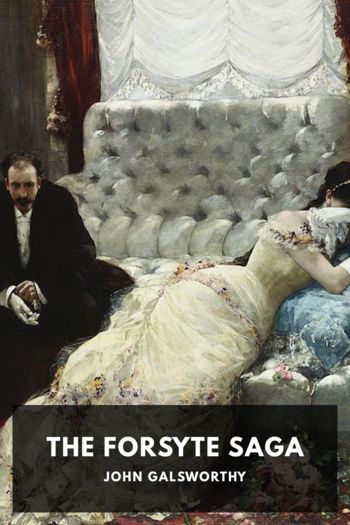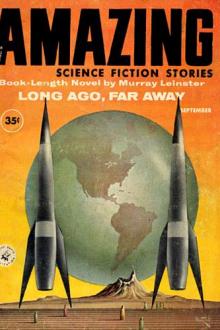The Forsyte Saga - John Galsworthy (best english novels for beginners .txt) 📗

- Author: John Galsworthy
Book online «The Forsyte Saga - John Galsworthy (best english novels for beginners .txt) 📗». Author John Galsworthy
That night, from the balcony of his bedroom, he gazed down on the roof of the town—as if inlaid with honeycomb of jet, ivory, and gold; and, long after, he lay awake, listening to the cry of the sentry as the hours struck, and forming in his head these lines:
“Voice in the night crying, down in the old sleeping
Spanish city darkened under her white stars!
“What says the voice—its clear—lingering anguish?
Just the watchman, telling his dateless tale of safety?
Just a road-man, flinging to the moon his song?
“No! ’Tis one deprived, whose lover’s heart is weeping,
Just his cry: ‘How long?’ ”
The word “deprived” seemed to him cold and unsatisfactory, but “bereaved” was too final, and no other word of two syllables short-long came to him, which would enable him to keep “whose lover’s heart is weeping.” It was past two by the time he had finished it, and past three before he went to sleep, having said it over to himself at least twenty-four times. Next day he wrote it out and enclosed it in one of those letters to Fleur which he always finished before he went down, so as to have his mind free and companionable.
About noon that same day, on the tiled terrace of their hotel, he felt a sudden dull pain in the back of his head, a queer sensation in the eyes, and sickness. The sun had touched him too affectionately. The next three days were passed in semidarkness, and a dulled, aching indifference to all except the feel of ice on his forehead and his mother’s smile. She never moved from his room, never relaxed her noiseless vigilance, which seemed to Jon angelic. But there were moments when he was extremely sorry for himself, and wished terribly that Fleur could see him. Several times he took a poignant imaginary leave of her and of the earth, tears oozing out of his eyes. He even prepared the message he would send to her by his mother—who would regret to her dying day that she had ever sought to separate them—his poor mother! He was not slow, however, in perceiving that he had now his excuse for going home.
Toward half-past six each evening came a “gasgacha” of bells—a cascade of tumbling chimes, mounting from the city below and falling back chime on chime. After listening to them on the fourth day he said suddenly:
“I’d like to be back in England, Mum, the sun’s too hot.”
“Very well, darling. As soon as you’re fit to travel.” And at once he felt better, and—meaner.
They had been out five weeks when they turned toward home. Jon’s head was restored to its pristine clarity, but he was confined to a hat lined by his mother with many layers of orange and green silk and he still walked from choice in the shade. As the long struggle of discretion between them drew to its close, he wondered more and more whether she could see his eagerness to get back to that which she had brought him away from. Condemned by Spanish Providence to spend a day in Madrid between their trains, it was but natural to go again to the Prado. Jon was elaborately casual this time before his Goya girl. Now that he was going back to her, he could afford a lesser scrutiny. It was his mother who lingered before the picture, saying:
“The face and the figure of the girl are exquisite.”
Jon heard her uneasily. Did she understand? But he felt once more that he was no match for her in self-control and subtlety. She could, in some supersensitive way, of which he had not the secret, feel the pulse of his thoughts; she knew by instinct what he hoped and feared and wished. It made him terribly uncomfortable and guilty, having, beyond most boys, a conscience. He wished she would be frank with him, he almost hoped for an open struggle. But none came, and steadily, silently, they travelled north. Thus did he first learn how much better than men women play a waiting game. In Paris they had again to pause for a day. Jon was grieved because it lasted two, owing to certain matters in connection with a dressmaker; as if his mother, who looked beautiful in anything, had any need of dresses! The happiest moment of his travel was that when he stepped on to the Folkestone boat.
Standing by the bulwark rail, with her arm in his, she said:
“I’m afraid you haven’t enjoyed it much, Jon. But you’ve been very sweet to me.”
Jon squeezed her arm.
“Oh! yes, I’ve enjoyed it awfully—except for my head lately.”
And now that the end had come, he really had, feeling a sort of glamour over the past weeks—a kind of painful pleasure, such as he had tried to screw into those lines about the voice in the night crying; a feeling such as he had known as a small boy listening avidly to Chopin, yet wanting to cry. And he wondered why it was that he couldn’t say to her quite simply what she had said to him:
“You were very sweet to me.” Odd—one never could be nice and natural like that! He substituted the words: “I expect we shall be sick.”
They were, and reached London somewhat attenuated, having been away six weeks and two days, without a single allusion to the subject which had hardly ever ceased to





Comments (0)